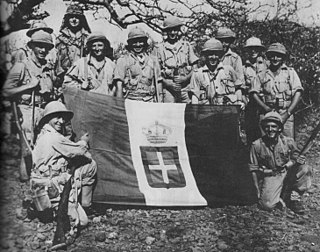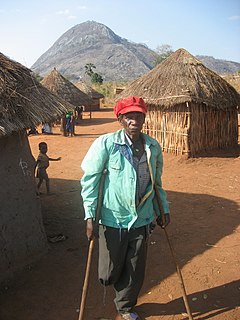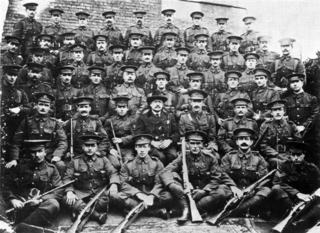 W
WThe East African campaign was fought in East Africa during the Second World War by Allies of World War II, mainly from the British Empire, against Italy and its colony of Italian East Africa, between June 1940 and November 1941. The British Middle East Command with troops from the United Kingdom, South Africa, British India, Uganda Protectorate, Kenya, Somaliland, West Africa, Northern and Southern Rhodesia, Sudan and Nyasaland participated in the campaign. These were joined by the Allied Force Publique of Belgian Congo, Imperial Ethiopian Arbegnoch and a small unit of Free French.
 W
WSouthern Rhodesia, then a self-governing colony of the United Kingdom, sent two military units to fight with the Commonwealth armed forces in the Malayan Emergency of 1948–60, which pitted the Commonwealth against the Malayan National Liberation Army (MNLA), the military arm of the Malayan Communist Party. For two years, starting in March 1951, white Southern Rhodesian volunteers made up "C" Squadron of the Special Air Service (SAS). The Rhodesian African Rifles, in which black rank-and-filers and warrant officers were led by white officers, then served in Malaya from 1956 to 1958.
 W
WThe Malayan Emergency (1948–1960) was a guerrilla war fought in the Federation of Malaya between Communist pro-independence fighters of the Malayan National Liberation Army (MNLA), the Malayan Communist Party's (MCP) armed wing, against the armed forces of the British Empire and Commonwealth. The communist forces fought to gain independence for Malaya from the British Empire and to establish a socialist economy, while the Commonwealth forces fought to combat communism and protect British economic and geopolitical interests. The fighting spanned both the colonial period and the creation of an independent Malaya in 1957. The conflict was called the "Anti-British National Liberation War" by the MNLA, but an "Emergency" by the British for insurance purposes, as London-based insurers would not have paid out in instances of civil wars.
 W
WThe Mozambican Civil War was a civil war fought in Mozambique from 1977 to 1992. Like many regional African conflicts during the late twentieth century, the Mozambican Civil War possessed local dynamics but was also exacerbated greatly by the polarizing effects of Cold War politics. The war was fought between Mozambique's ruling Marxist Front for the Liberation of Mozambique (FRELIMO), the anti-communist insurgent forces of the Mozambican National Resistance (RENAMO), and a number of smaller factions such as the PRM, UNAMO, COREMO, UNIPOMO, and FUMO.
 W
WThe Rhodesian Bush War—also called the Second Chimurenga as well as the Zimbabwe War of Liberation—was a civil conflict from July 1964 to December 1979 in the unrecognised country of Rhodesia . The conflict pitted three forces against one another: the Rhodesian white minority-led government of Ian Smith ; the Zimbabwe African National Liberation Army, the military wing of Robert Mugabe's Zimbabwe African National Union; and the Zimbabwe People's Revolutionary Army of Joshua Nkomo's Zimbabwe African People's Union.
 W
WWorld War I or the First World War, often abbreviated as WWI or WW1, was a global war originating in Europe that lasted from 28 July 1914 to 11 November 1918. Contemporaneously known as the Great War, the World War, and "the war to end all wars", it led to the mobilisation of more than 70 million military personnel, including 60 million Europeans, making it one of the largest wars in history, and also one of the deadliest conflicts in history, with an estimated 8.5 million combatant deaths and 13 million civilian deaths as a direct result of the war. Resulting genocides and the related 1918 Spanish flu pandemic caused another 17–100 million deaths worldwide, including an estimated 2.64 million Spanish flu deaths in Europe and as many as 675,000 in the United States.
 W
WWhen the United Kingdom declared war on Germany at the start of World War I in August 1914, settler society in Southern Rhodesia, then administered by the British South Africa Company, received the news with great patriotic enthusiasm. The Company administrator, Sir William Milton, wired the UK government, "All Rhodesia ... ready to do its duty". Although it supported Britain, the Company was concerned about the possible financial implications for its chartered territory should it make direct commitments to the war effort, particularly at first, so most of the colony's contribution to the war was made by Southern Rhodesians individually—not only those who volunteered to fight abroad, but also those who remained at home and raised funds to donate food, equipment and other supplies.
 W
WSouthern Rhodesia, then a self-governing colony of the United Kingdom, entered World War II along with Britain shortly after the invasion of Poland in 1939. By the war's end, 26,121 Southern Rhodesians of all races had served in the armed forces, 8,390 of them overseas, operating in the European theatre, the Mediterranean and Middle East theatre, East Africa, Burma and elsewhere. The territory's most important contribution to the war is commonly held to be its contribution to the Empire Air Training Scheme (EATS), under which 8,235 British, Commonwealth and Allied airmen were trained in Southern Rhodesian flying schools. The colony's operational casualties numbered 916 killed and 483 wounded of all races.
 W
WWorld War II or the Second World War, often abbreviated as WWII or WW2, was a global war that lasted from 1939 to 1945. It involved the vast majority of the world's countries—including all of the great powers—forming two opposing military alliances: the Allies and the Axis powers. In a total war directly involving more than 100 million personnel from more than 30 countries, the major participants threw their entire economic, industrial, and scientific capabilities behind the war effort, blurring the distinction between civilian and military resources. Aircraft played a major role in the conflict, enabling the strategic bombing of population centres and the only two uses of nuclear weapons in war to this day. World War II was by far the deadliest conflict in human history, and resulted in 70 to 85 million fatalities, a majority being civilians. Tens of millions of people died due to genocides, starvation, massacres, and disease. In the wake of the Axis defeat, Germany and Japan were occupied, and war crimes tribunals were conducted against German and Japanese leaders.